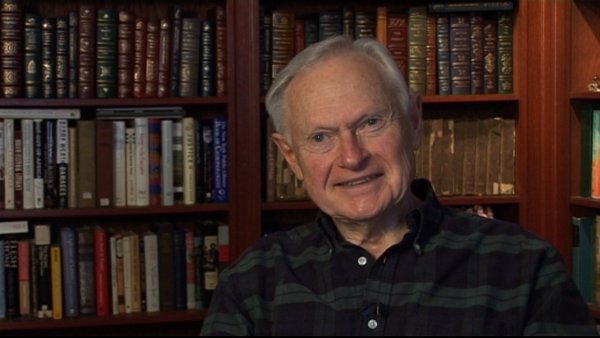NEXT STORY

Filling a flyleaf with my first story
RELATED STORIES

NEXT STORY

Filling a flyleaf with my first story
RELATED STORIES


|
Views | Duration | |
|---|---|---|---|
| 1. Unassimilated parents | 1 | 2257 | 04:24 |
| 2. School – a frightening adventure | 1 | 783 | 02:00 |
| 3. Discovering the library | 1 | 602 | 02:59 |
| 4. Filling a flyleaf with my first story | 1 | 458 | 03:24 |
| 5. Fascinated by the beauty of my cadences | 505 | 01:59 | |
| 6. Getting money for college | 496 | 02:03 | |
| 7. I get captivated by medicine | 474 | 02:43 | |
| 8. Why I had to change my name | 2353 | 02:56 | |
| 9. Doctors – the highest forms of human beings | 1 | 619 | 04:22 |
| 10. 'Working my bloody tail off' | 501 | 02:48 |

I got my library card and started coasting up and down the aisles, and I saw this red-covered book, relatively thin, not too much to take. It was called Ab the Caveman. And what it was about - purportedly what it was about - was the life of a fellow named Ab who lived in prehistoric times. And there were pictures in it. Lithographs – they almost looked like photographs – of Ab and his family and talked about his hunting and his adventures. Well… what an eye-opener that was! It took me to a time that obviously I'd never been in. It took me to a place I couldn't even imagine. I had never read about prehistoric times. And I just took that book home and I read through it immediately and went right back, and in those days, you could only take two books, and I went and took two more books, and in later years, when you could take four, I would take these four home, and I just couldn't stop reading because there were these marvellous worlds out there. And I was fortunate, in that I could always read very swiftly. I never used a dictionary, although I was told over and over again by various people that I should. But I discovered that all words that I didn't know were in context, and they were going to come up again. So, by the second or third time that I had seen an unusual word, I would know it.
The other very good thing that I was lucky with was that a distant relative had a series called the Book of Knowledge. It had 20 volumes in it, and it may still exist. They may have updated it again and again. The one this relative had dated from before World War I and they wanted to throw it out, but instead they gave it to us. Everything was in there: French lessons were in there, chapters about communication, transportation, inventions, history… current culture, current 1912, 1913. The pictures were very quaint. The French lessons were ornamented by Frenchmen with their moustaches curling up towards their ears and little pointed beards. And I would just curl up in an armchair for hours at a time and not look for anything in particular, just read what interested me. It's what I do with the business section of The New York Times today. I don't know the first thing about business, but I find interesting articles and I read them, and as time goes on, you start accumulating some knowledge.
Sherwin Nuland (1930-2014) was an American surgeon and author who taught bioethics, the history of medicine, and medicine at the Yale University School of Medicine. He wrote the book How We Die which made The New York Times bestseller list and won the National Book Award. He also wrote about his own painful coming of age as a son of immigrants in Lost in America: A Journey with My Father. He used to write for The New Yorker, The New York Times, Time, and the New York Review of Books.
Title: Discovering the library
Listeners: Christopher Sykes
Christopher Sykes is a London-based television producer and director who has made a number of documentary films for BBC TV, Channel 4 and PBS.
Tags: Ab the Caveman, The Book of Knowledge
Duration: 2 minutes, 59 seconds
Date story recorded: January 2011
Date story went live: 13 September 2011